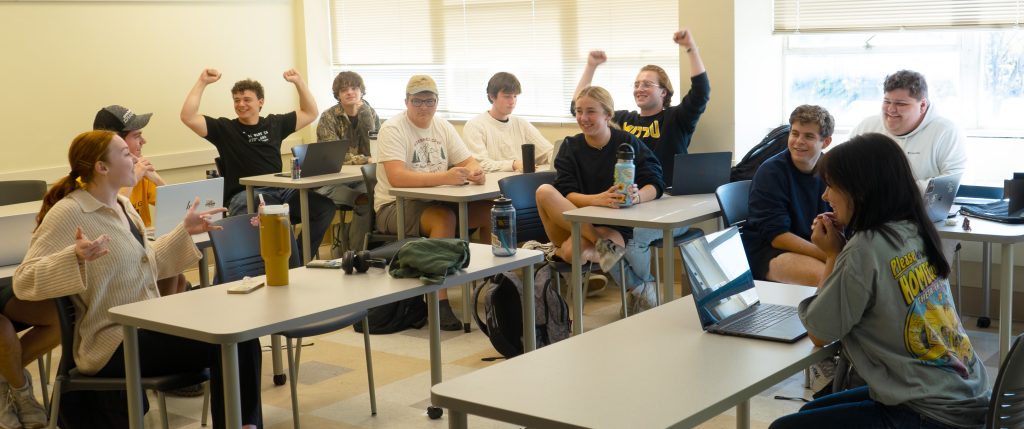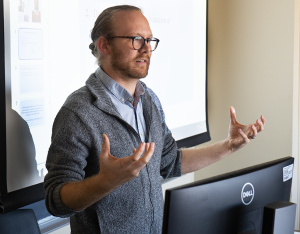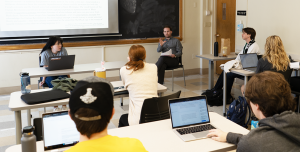
Revolutions are a team effort. For one Honors College series, education is, too.
Matthew Frierdich and Billy Coleman, faculty in the Honors College and the Kinder Institute on Constitutional Democracy, are leading the charge together in a Kinder-Honors collaboration about the revolutionary movements of the world. The class, titled simply, “Revolutions,” is the first in the two-class Social Sciences Series offered through the Honors College. The sequel is “Constitutions.”

Frierdich, assistant teaching professor of political science, says, “We’re working really closely together. We have different backgrounds, different training, different assumptions about how to approach the class. We’ve learned a lot from each other.”
Coleman, assistant teaching professor of history, adds, “There are different questions you can ask of the same material. As a historian, you tend to want to know why things happened in a very specific, contextualized way, whereas a political scientist will be more interested in how things tend to happen, so you can figure out why that’s relevant for the present and future. Team teaching is good. You hear one part of the story from one and another from the other.”
Frierdich is originally from Kirkwood, Missouri, and received his undergraduate degree from Drury University in Springfield, Missouri, as well as a Ph.D. in political theory from the University of Virginia. After graduating, he pursued divinity school in Nashville and was employed as a hospital chaplain for five years. Being a source of comfort and support for staff and patients during times of political and administrative crises made him realize he wanted to get back into politics.
Coleman is originally from Texas but grew up in Sydney, Australia from the age of 8. He received his Ph.D. in American history in at University College London and came to Mizzou for a post-doctoral opportunity.
“Since I was an American growing up elsewhere, I was always the American kid. If an American question came up, people would assume I knew the answer to it. I didn’t have more knowledge about America than a typical 8-year-old. I got tired of not knowing the answers to questions and found an interest in it.”
The Social Sciences Series had been taught in the past and the current version has been discussed for a while. The efforts of the Honors College and the Kinder Institute came into fruition this semester, and, naturally, had two professors at the helm.

Together, Coleman and Frierdich combine their expertise to provide a complete picture of revolutions and constitutions in their historical and political contexts. Their lectures are supplemented by speakers from a range of disciplines, from theater to Black studies.
Frierdich has delved into revolutions and social movements in the past. His doctoral dissertation, titled, “Turning Rubble and Memory into Seeds: Visions of Democracy in Monument Removal,” focused on the history of social movements around removal of monuments, like the removal of Confederate monuments in the United States.
Right now, the class is exploring the American Revolution, which is the lynchpin of the class. Coleman and Frierdich spend four weeks on the subject. The class covers revolutions from Spartacus to the Latin American revolutions.
The class is not strictly chronological. Frierdich says, “We’re just trying to think broadly about where we get this concept of a revolution. What do we mean by this term ‘revolution?’ What’s the cost? Who’s being asked to bear them?”
The series is also not strictly sequential, either. Frierdich doesn’t want to assume that revolutions and constitutions are a strictly linear process that drives one to the other, saying, “We don’t study revolutions to study constitutions.”
The syllabus offers a dissection of the past, but Frierdich and Coleman are hopeful for the sequence’s future. Other sequences, like the Humanities Sequence, are long-standing institutions in the Honors College. “Revolutions and Constitutions” is in its infancy, but the professors believe it could one day carve out its own niche in the Honors ecosystem.
“We’d love to keep having faculty keep coming back, keep doing more sections and get bigger, have more and more voices involved,” Frierdich says.
Coleman says, “We’re hoping to add special opportunities for students who have completed both courses.”
The class is open to all Honors students, especially those with an interest in politics and history. A wide variety of majors take the class. As a class about change, it won’t stay static, either. Coleman says, “Over the years, we’re hoping [the courses] are able to evolve with the times.”
“That’s what the class is about. What are the ways that change happens?” Frierdich adds.